Franchising, retail, business
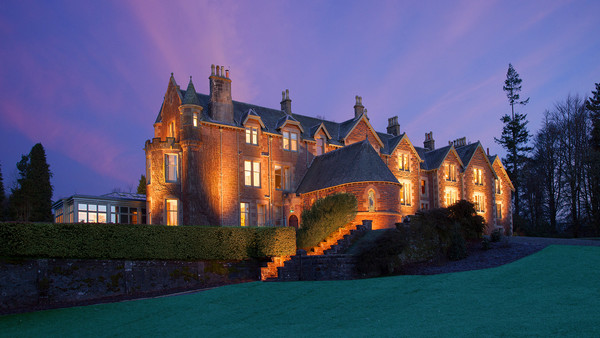
04/04/2014
Andy Murray’s hotel in central Scotland has just opened but there is no sign of the Wimbledon and Olympic tennis champion. When it was first announced that Murray was going to open Cromlix, a luxury country house hotel near his home town of Dunblane, headlines gleefully dubbed it “Double Faulty Towers” after the British TV sitcom set in a hotel. But visitors expecting Murray to chase them maniacally round the 15-suite Victorian house in a Basil Fawlty-esque manner will be disappointed. The 26-year-old Scot is usually pretty busy pursuing his other career as a world-class tennis player.
Don’t waste any time scanning the walls for old photos or Murray memorabilia, either. His mother Judy – who is at the hotel for the launch, and has evidently been as involved in the project as she has in her son’s tennis career – tells me Andy was very clear that the restoration project should be about the house rather than about him. Indeed, even though the suites are named after famous Scottish people past and present, the Murray name is not on any of the doors.
So far, so very understated. Fortunately for visitors attracted to this part of Perthshire by Murray’s name, his influence is more clearly signposted elsewhere – he won rare permission from the All England Club to have Cromlix’s tennis courts designed in the green-and-purple colours synonymous with Wimbledon.
Though he has yet to play on them, I am welcome to do so, says a man giving the courts their final check. I have brought my trainers, so I give myself a quick thrashing, hitting balls against the practice wall.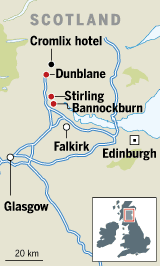
It was also Murray, known for being a proud Scot, who chose which of his compatriots’ names would grace Cromlix’s suites.
You might have guessed that Sean Connery would make it but what about Elsie Inglis, a doctor who campaigned for women’s healthcare and suffrage, and who appears on Scottish £50 notes? Meanwhile, the suites honouring sporting legends Sir Alex Ferguson and Sir Chris Hoy have almost locker room sized bathrooms with special steam showers.
Perhaps appropriately for an FT journalist, I have been allocated the suite named after Andrew Carnegie, the poor Dunfermline-born boy who in the late 19th century became one of America’s leading plutocrats and philanthropists.
It occupies its own wing and costs £600 a night in peak season.
A spacious entrance hall branches into a vast sitting room, then a bathroom with a striking copper bathtub and finally a double bedroom fit for a successful industrialist, with views of some of Cromlix’s 34 acres and the aforementioned tennis courts.
It’s so big I find it hard to decide where to sit.
News of Murray’s purchase of Cromlix (for £1.9m) first spread in February 2013. Initial speculation suggested the star, who has a house in Surrey, had bought it as a private retreat in the area where he grew up and where his mother still lives.
It soon emerged, however, that he was investing not only in a property but in a business. Murray has earned more than £20m in prize money in his career so far, including £1.6m for winning Wimbledon last summer.
Murray has earned more than £20m in prize money in his career so far, including £1.6m for winning Wimbledon last summer.
Following that victory he set up his own management company with Simon Fuller, the man behind Brand Beckham, and his off-court earnings were predicted to rise quickly from the £10m he generated in 2012.
By contrast, Fred Perry, the last British men’s singles champion in 1936, cashed in on his fame by pioneering his own range of sweatbands.
In simple terms, Cromlix could be one more example of a famous sports star expanding his brand into business.
Unsurprisingly, management of the hotel has been contracted out to a specialist company, ICMI, which looks after seven other properties in Scotland including Inverlochy Castle.
And the marriage of old-style country house charm and modern convenience – gilt-framed mirrors disguise wall-mounted TVs and so on – has been expertly managed. Highlights of a painstaking, year-long renovation process include the dramatic restored chapel, dating from 1879, while in the billiards room you can imagine what it was like to be Colonel Arthur Hay-Drummond, one of the former Lairds of Cromlix.
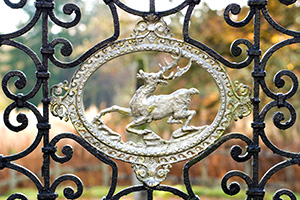 As at other ICMI hotels, there is a restaurant overseen by celebrated chef Albert Roux. Murray’s team decline to reveal the cost of the refurbishment, but it’s clear little expense has been spared.
As at other ICMI hotels, there is a restaurant overseen by celebrated chef Albert Roux. Murray’s team decline to reveal the cost of the refurbishment, but it’s clear little expense has been spared.
As a global celebrity, Murray could have opened a hotel anywhere, but the choice of unglamorous Dunblane over, say, Dubai, certainly seems authentically Murray-esque. Arriving in town on a weekday lunchtime, I learn that the signpost to the tourist information centre has outlasted the actual tourist information centre by five years.
“Am I mad? No, just excited!” the normally unexcitable star told a Scottish tourism conference last month.
In fact, Cromlix had a long history as a hotel – including being named UK hotel of the year in 1982 – before finally closing its doors in 2012.
In 2010, Murray’s brother Jamie was married there; his grandparents had their silver wedding anniversary there too. “The hotel holds some special memories for us and for Dunblane,” Murray has explained.
The new Cromlix will create 40 jobs – most local – and likely knock-on effects for nearby businesses and the new owner has described his pleasure at “being able to give something back to the community I grew up in”.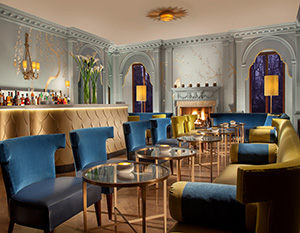 That community got pretty excited about Murray’s tennis success last year but press reports ahead of the opening had described local “outrage”, with tenants of houses on the Cromlix estate claiming to have been “evicted” to make way for hotel staff.
That community got pretty excited about Murray’s tennis success last year but press reports ahead of the opening had described local “outrage”, with tenants of houses on the Cromlix estate claiming to have been “evicted” to make way for hotel staff.
The Murrays have stated the houses were bought with vacant possession on the understanding that the tenants were on short-term leases and would be given sufficient notice.
In Dunblane I talk to a cheery shopkeeper whose customers include Murray’s grandmother.
He is upbeat about the chances Cromlix is bringing to the area while lamenting the couple of “hoo-has” of the kind that are bound to happen whenever a celebrity decides to do something like this, particularly in a small community.
Still, he says, Murray got a pretty good bargain. “And he won’t be playing tennis for ever,” he observes sagely.
The Wimbledon champion’s name should be a boon for the area’s tourism industry, attracting visitors who might otherwise overlook its attractions.
On a beautiful sunny spring day, these are clear. Rugged countryside is crowned by the still-snowcapped peak of Ben Ledi in the Trossachs, and there are plenty of rivers for fishing, as well as Cromlix’s very own loch.
Murray says one of his personal favourite days out is Stirling Castle, which he describes as a “very prestigious monument”, not to mention a key battleground during earlier struggles over Scottish independence.
For Murray-watchers, Dunblane itself is just a couple of miles from Cromlix. This is where young Andy and his older brother Jamie grew up, and you can check out the tennis club where they first began to compete.
At one end of the high street, a postbox painted gold commemorates the Olympic medal that Murray won at London 2012. The museum beside Dunblane cathedral (jaw-droppingly large for a town of 8,000 people) displays the type of Murray memorabilia you won’t find at Cromlix.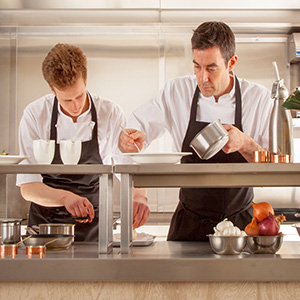 Dunblane is also where, 18 years ago, a gunman entered the primary school where the brothers were pupils and shot 17 dead before killing himself.
Dunblane is also where, 18 years ago, a gunman entered the primary school where the brothers were pupils and shot 17 dead before killing himself.
Looking at the heart-wrenching memorial in the cathedral, it occurs that perhaps one of the less tangible benefits of having a hotel with a global profile in the area is that in future there will be other ways for outsiders to define the town.
We sit down to eat in the Chez Roux restaurant just as Murray is walking on court in Miami to face Novak Djokovic for the first time since that famous Wimbledon final.
The food, including a signature twice-baked cheese soufflé in cream, blends the local and the innovative, much like the hotel.
The bright dining room, including a contemporary finishing kitchen where you can watch the chefs, was added in the renovation, a palate-cleansing diversion from the weightier Victorian vibe elsewhere. In Miami, Murray endures a less enjoyable night, losing to his rival – and I wonder what form his next investment might take.
In Miami, Murray endures a less enjoyable night, losing to his rival – and I wonder what form his next investment might take.
Djokovic was apparently once offered the chance to invest in a Serbian donkey cheese so sought-after it sells for £800 per kilo.
For Murray, another hotel seems more obvious. His mother confirms Cromlix is already booked out during the Ryder Cup at Gleneagles in September and says it could have been filled many times over.
So is this just the first in a chain of Andy Murray hotels?
“No!” she exclaims quickly as if exhausted at the very thought. “We did this because it’s on our doorstep.”
By: Financial Time